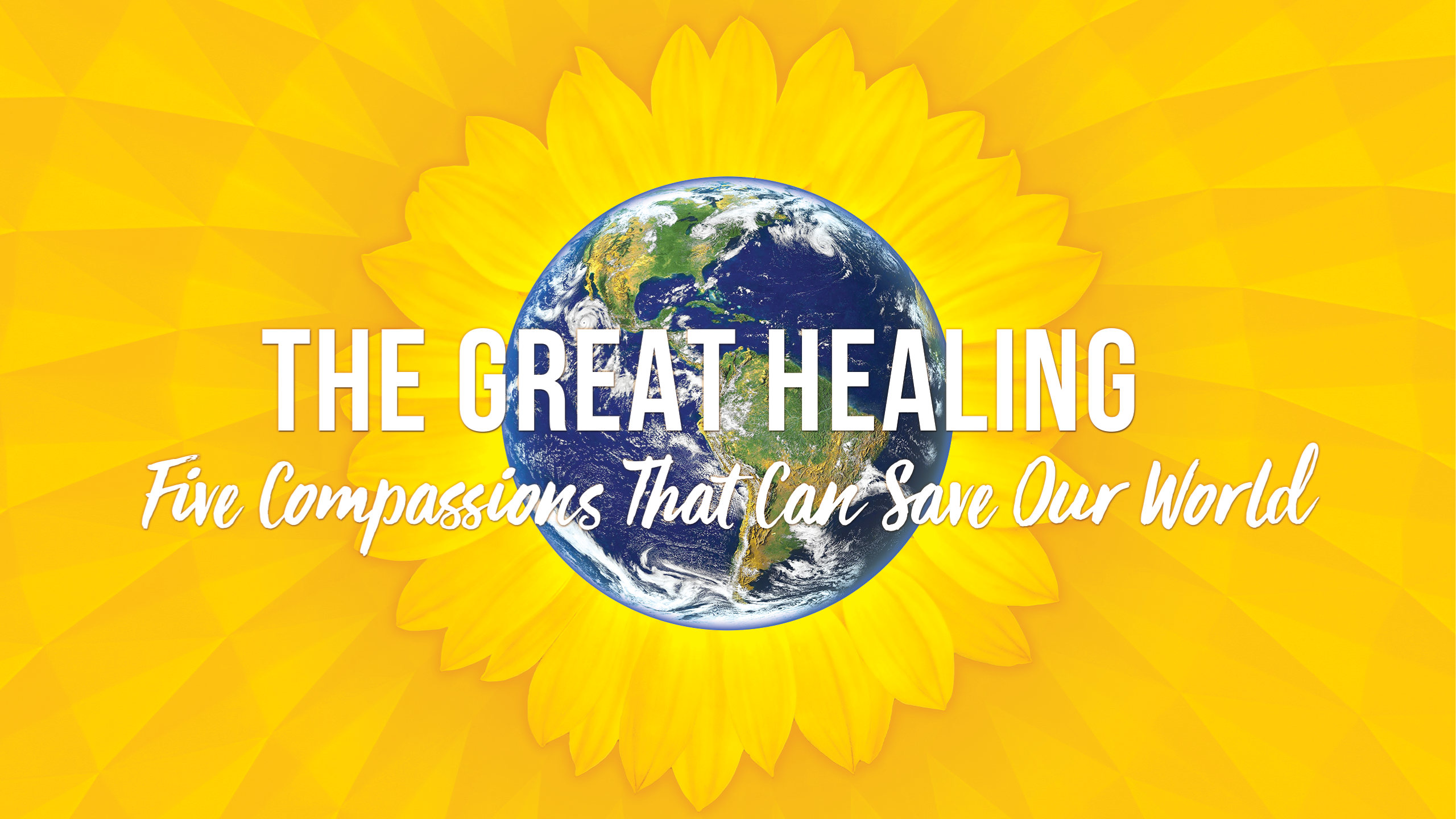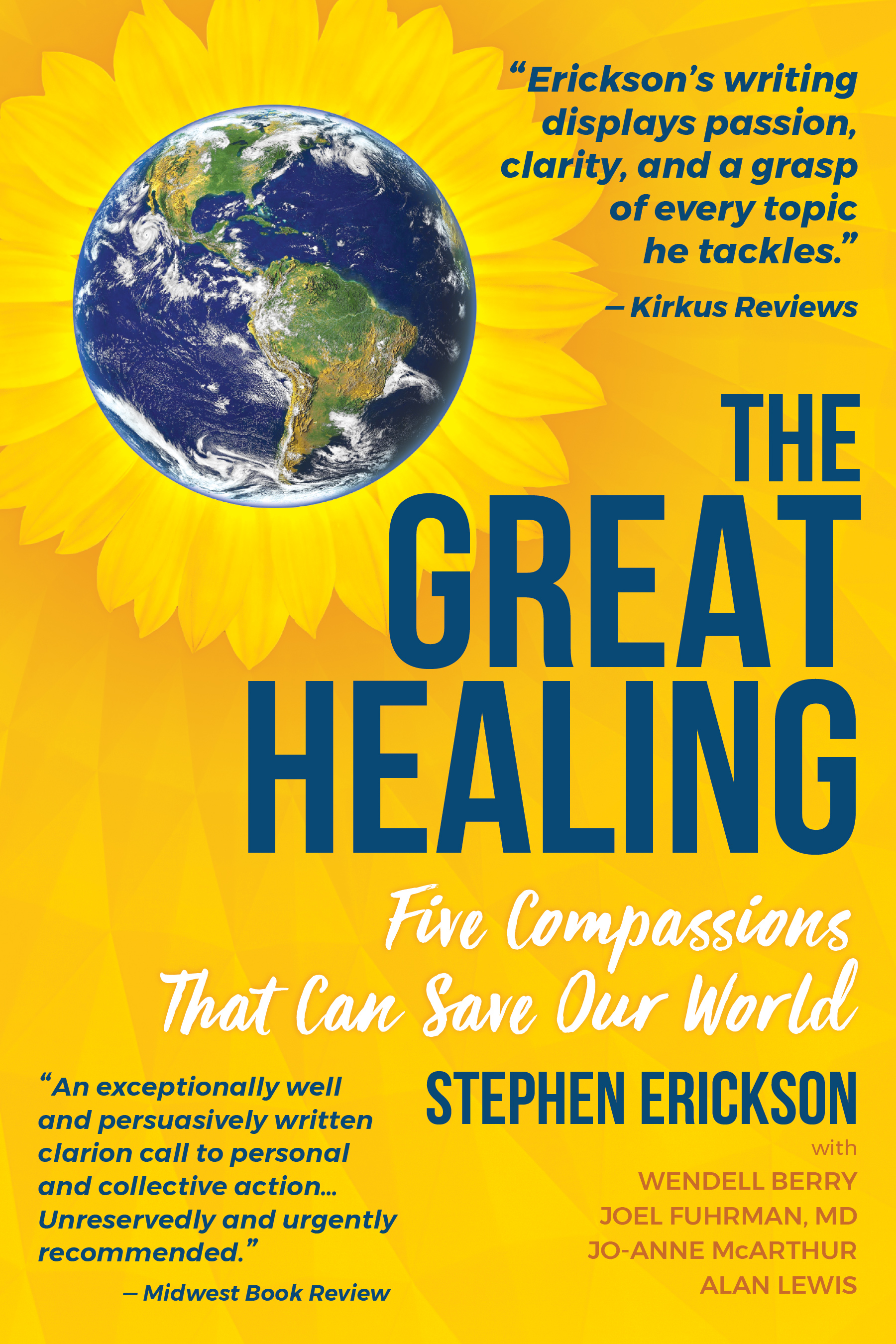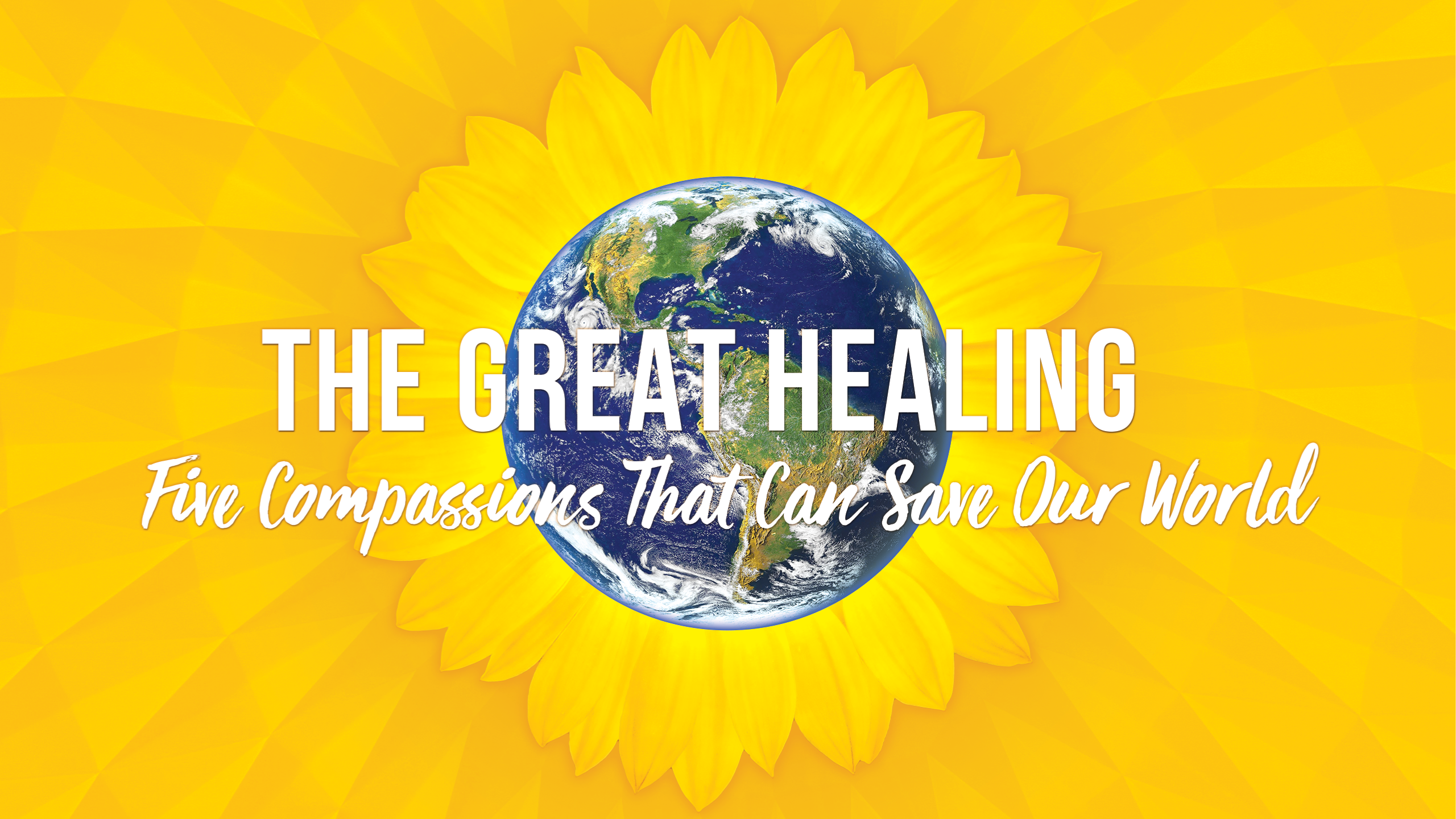
Eating safe healthy food increases your immunity, reverses diabetes, minimizes risk of heart attack, cancer and dementia. Living a compassionate life begins by taking compassionate, loving care of your Self. This is the 2nd Compassion. This 11-part series excerpts Chapter 2 of the new book, The Great Healing – Five Compassions That Can Save Our World.
“An exceptionally well and persuasively written clarion call to personal and collective action, The Great Healing – Five Compassions That Can Save Our World is unreservedly and urgently recommended.”
— Midwest Book Review
_________________________________________
PART 9
Over the past few centuries life expectancy worldwide has increased steadily. Max Roser has the statistics. “Since 1900 the global average life expectancy has more than doubled and is now approaching 70 years. No country in the world has a lower life expectancy than the countries with the highest life expectancy in 1800.”[i] How much longer is the average lifespan for those of us who lived from age 5 onwards? Max Roser has that answer as well: “To see how life expectancy has improved without taking child mortality into account we therefore have to look at the prospects of a child who just survived their 5th birthday: in 1841 a 5-year old could expect to live 55 years. Today a 5-year old can expect to live 82 years. An increase of 27 years.”[ii]
Imagine you were approaching age 60 a century ago. You were aged. Life was more brutal, more physically demanding, modern medicine — such as you then perceived it — was crude, inept, inadequate, even barbaric by today’s standards. You were a smaller person — a foot shorter on average. Weather, illness, and disease hit you with more severity. You were approaching the ceiling of the average lifespan for that time. Many of your contemporaries would have already passed, perhaps even one or more of your children.
Approaching age 60 today should not mean entering the twilight of your life — or anywhere near it. Our 50’s, our 60’s, and our 70’s can be the most creative, fertile, enjoyable of times.
Life expectancy has decreased in the United States each of the past three years. For our next generation, if we don’t change things decisively, it will be lower still — much lower.
. . .
IV
Here then is the call. Calling out to you. The second Compassion essential for The Great Healing is compassion for self. Fundamental to living a compassionate life is taking compassionate, loving care of your health and your self.
It all starts with you. It has to. Just as when you are flying and you are instructed that should the plane have a problem and the oxygen masks drop down, you must secure your own mask first before reaching to help your children or any others you are traveling with.
Karen Bluth, a self-compassion and mindfulness researcher and teacher with a Ph.D. in Child and Family Studies, writes, “Almost 80% of us treat others with more compassion and kindness than we offer to ourselves. When our friends have a bad day, we support them in every way we know how; when we’re having a bad day or fail at something, we generally beat ourselves up with self-criticism.”
She notes, “Research has shown that teens and adults can benefit from self-compassion in a variety of ways. For teens self-compassion appears to have a protective effect against trauma, peer victimization, depression and self-harm, and low self-esteem. Contrary to what some believe, studies suggest that self-compassionate people have greater motivation to improve, not less: They don’t let themselves off the hook for bad behavior but confront their shortcomings head-on. Self-compassionate people don’t get mired in selfishness or self-pity,” and here it comes, the ride-along, the bonus value… “but actually have greater compassion toward others.”[iii]
The Golden Rule. Time honored advice to behave admirably, honorably and well toward others. Consider the Golden Rule in terms of nourishing and taking care of your body temple by reversing its order: Do unto yourself as you would do unto others. The Golden Rule is one of compassion.
You were born into this world with a purpose.
That may be a plan in mind for you from a higher power, whatever you believe that source to be. It may come from within, a soul-deep sense of destiny. Or you may feel you are here to discover your purpose on your life’s journey. You are here to learn from and overcome challenges and adversity, to evolve and to fulfill that purpose. And you will need your toolkit with all the means you have at your disposal, the array of skills you have learned and developed — your gifts and the talent and the perspective that are uniquely yours and yours alone.
You can’t realize your fullest potential if you are not as physically healthy as you can be — and if the majority of us no longer are then we need to recognize that, understand why, and take action to regain full health and vitality.
You are being victimized. Your health may have been, is being, or is in danger of being taken away from you. But youneed not be a victim.
Dr. Hyman writes, “I never tell my patients to lose weight. I only tell them how to get healthy. When you get rid of the bad stuff and put in the good stuff, your body can heal and repair quickly. It doesn’t take months or years. It takes days.”[iv]
It is very important what you eat, every time you eat. “Food is not just a source of energy or calories. Food is information. It contains instructions that affect every biological function of your body. It is the stuff that controls everything. Food affects the expression of your genes (determining which ones get triggered to cause or prevent disease) and influences your hormones, brain chemistry, immune system, gut flora, and metabolism at every level,” observes Dr. Hyman. “It works fast, in real time with every bite.”
Numerous studies prove how important and effective a healthy diet and lifestyle is in reducing diabetes and the risk factors for all of these diseases. One study, Healthy Living is the Best Revenge looked at 23,153 Germans who were among 500,000 participants from ten countries in the European Prospective Investigation into Cancer and Nutrition. The study identified lifestyle adherence to four factors in that group: they had never smoked, they had a BMI of 30 or lower (i.e. they were not obese), they engaged in 3.5 hours per week of physical activity, and they ate a healthy diet defined as a “high intake of fruits, vegetables, and whole-grain bread and low meat consumption.” The data was studied with a follow up of 7.8 years.
Take a moment to consider that before you read the results that follow. This was a huge recent study, involving a half a million people — a fully realized study spanning nearly 8 years.
Compared to the participants in the study who did not adhere to those four healthy diet and lifestyle factors, the group that did had 93% less diabetes and 81% fewer heart attacks. They suffered 50% fewer strokes and had 36% less cancer.[v]
Those are large, significant numbers. Be one of them. Embrace this lifestyle.
. . .
Nourish your body with healthy food.
Each year, U.S. News & World Report ranks 40 leading diets after they are evaluated by a panel of health experts based on these criteria: easy to follow, nutritious, safe, effective for both short- and long-term weight loss, and protective against diabetes and heart disease. In 2019, the top three — the Mediterranean Diet, the DASH (Dietary Approaches to Stop Hypertension) Diet, and the Flexitarian Diet — each emphasize predominantly plant protein. They recommend fruits, vegetables, whole grains, healthy fats (such as olive oil) and lean proteins. They limit red meat, processed foods and refined sugars. These diets are linked in the Notes section here.[vi] [vii]
A study published in the Proceedings of the National Academy of Sciences, Analysis and Valuation of the Health and Climate Change Co-benefits of Dietary Change, revealed that changing to diets consuming fewer animal-sourced foods has major health benefits resulting in 5.1 million avoided deaths worldwide each year: “45-47% of all avoided deaths were from reduced coronary heart disease, 26% from stroke, 16-18% from cancer, and 10-12% from type 2 diabetes.”[viii] A separate study involving over 500,000 people confirmed that a diet low in red and processed meat intake is associated with increased longevity.[ix]
The Global Burden of Disease, published by The Institute for Health Metrics and Evaluation at the University of Washington, is an in-depth global evaluation of health risks in 188 counties. It identified 14 avoidable dietary risk factors that combine to contribute to the highest number of deaths worldwide. In 2013, 21% of total deaths in the U.S. were attributed to these, “including diets low in fruit, whole grains, and vegetables, and diets high in red meat and sugar-sweetened beverages.” Dr. Ali Mokdad, an author in this study, said, “Many of the leading causes of death in the U.S. are preventable. It is important to remember that we need to focus on preventing these risk factors such as smoking, obesity, and poor diet.”[x]
Regarding diabetes, in Too Much Animal Protein Tied to Higher Diabetes Risk, Frank Hu, M.D., of the Harvard School of Public Health is quoted, “Several previous studies have found that higher intake of total protein, especially animal protein, are associated with long-term risk of developing diabetes… In other studies, plant protein sources such as nuts, legumes and whole grains have been associated with lower risk of diabetes, therefore, replacing red meat and processed meat with plant sources of protein is important for diabetes prevention.”[xi]
Regarding heart attack and cardiovascular risk, the benefits of a healthy diet happen right away. A plant-based diet is shown to reduce blood pressure and other risk factors in cardiovascular patients within four weeks.[xii]
In 2017, insights firm GlobalData found that 70% of consumers worldwide are now moderating their meat intake or avoiding meat altogether. “Consumer perceptions around protein and the role of vegetables in meals are dramatically shifting with no signs of slowing down. Thanks to a new focus on flavor, innovative and exotic vegetable dishes are emerging to dial up craveability. As a result, more and more consumers are embracing this new way of eating.”[xiii]
Regarding cancer, the website of the American Institute for Cancer Research advises: “To reduce your cancer risk, eat no more than 18 ounces (cooked weight) per week of red meats, like beef, pork and lamb, and avoid processed meat such as ham, bacon, salami, hot dogs and sausages… The Continuous Update Project reports concluded there was convincing evidence that red meat and processed meats are a cause of colorectal cancer, processed meats are also a probable cause of stomach cancer.”[xiv] The italics are mine. A research study published in April 2019 determined that people who eat red and processed meat 4 times a week or more have a 20% higher risk of colorectal cancer.[xv] Doctors at the Mayo Clinic in Arizona analyzed data from 6 studies containing over 1.5 million people and their review, Is Meat Killing Us? published in the Journal of the American Osteopathic Association, concludes that, yes, it is. “The evidence is consistent that increased intake of red meat, especially processed red meat, is associated with increased all-cause mortality. Red meat also increases cardiovascular disease and cancer mortality.” The review recommends, “Physicians should encourage patients to limit animal products when possible and substitute red meat and processed red meat with plant-based foods.”[xvi]
A French government study of 69,000 people over a four-year period, released in October 2018, Association of Frequency of Organic Food Consumption with Cancer Risk, found that those who ate the most organic, pesticide-free foods, were 25% less likely to develop cancer.[xvii] [xviii]
Cancer survivor Chris Wark confirms Dr. Joel Fuhrman’s nutritional advice in his article, The Top 10 Vegetables You Can Eat to Prevent and Reverse Cancer.[xix]
Healthy food reduces your risk for every disease in this chapter. And the benefit begins with your next bite.
Eating healthfully is essential to keeping your brain performing optimally. Dr. Dale Bredesen, Director of Neurodegenerative Disease Research at the UCLA School of Medicine, finds in his book, The End of Alzheimer’s: The First Program to Prevent and Reverse Cognitive Decline, that “Only 5% of Alzheimer’s cases are ‘familial’… the rest are caused by lifestyle factors over which we had a great deal of control; hence, we have the ability to improve or even reverse most cases of the disease.”[xx] There is no medical cure for Alzheimer’s disease. It kills over half-a-million Americans each year making it the third leading cause of death in the United States.[xxi] Dr. Bredesen states that Alzheimer’s “strikes about 15% of the population, so it’s incredibly common. In fact, you have the pathophysiology of the disease for about 20 years before diagnosis is made.”Type 3 diabetes should be rare. 95% of cases are preventable, and prior to its advanced stages, it is reversible.
The elevation of blood sugar is increasingly associated with an increased risk for dementia. A study published in January 2018 that tracked 5,189 participants for over a decade, revealed “significant” associations between diabetes and the acceleration of cognitive decline. “Memory, executive function and orientation z scores all showed an increased rate of cognitive decline with diabetes.”[xxii] Dr. Bredesen recommends adopting a plant-based diet to all his patients in addition to exercise, stress reduction and optimal sleep.[xxiii]
It is all about the food. What you eat is crucial.
Dietitian Susan Levin really likes beans. “Beans are one of the superfoods that I always recommend to my patients. Beans are packed with protein, with fiber, an important nutrient 97% of Americans fall short on. Fiber, which is only found in plant foods, can help control weight, lower cholesterol and even fight off cancer. Fiber also helps control blood glucose, which may be why studies show that beans could play a key role in stemming our growing type 2 diabetes epidemic.”[xxiv] The president of Physician’s Committee for Responsible Medicine’s Dr. Neal Barnard’s Cookbook for Reversing Diabetes contains 150 delicious recipes and explains in an easy-to-understand way the relationship between plant-based nutrition and healthy living.[xxv]
It is all about awareness and understanding. Dr. Fung has observed in many of his patients that, once they understand the problem and act on it, they start to get better. “It’s a natural solution to this problem, it’s available to anybody in the world and it’s free. That’s amazing. We can prevent all of this disease and everything that goes along with it, not to mention save people a lot of money on their drugs. We can prevent the heart attacks, the cancers, the strokes, the Alzheimer’s disease, the kidney disease — all of this preventable for free.”[xxvi]
Eat predominantly the right foods and balanced meals in moderate portions. Invigorate your health and energy by honoring yourself with every bite.
. . .
_________________________________________
Stephen Erickson is an author and a dedicated environmental and animal activist for 30 years. He is also a screenwriter, feature filmmaker, and former Home Entertainment executive. He lives in Los Angeles and has 3 children.

The Compassion For Self Series is excerpted from The Great Healing – Five Compassions That Can Save Our World. The book is available on Amazon or at thegreathealing.org
“Erickson’s ability to connect climate science, copious data, and public policies with the lived experiences of people and other creatures sets this book apart. His emphasis on humane and caring methods reminds readers that winning hearts and minds is a prerequisite to capturing carbon. An inspired synthesis of environmental, cultural, economic, and political calls to action.” — Kirkus Reviews
“A comprehensive entreaty to save a rapidly dying Earth with compassionate activism… This alarming but not alarmist work provides purposeful, accessible, and concrete ways to counter and prevent ecological damage.” — Book Life Review by Publishers Weekly
_________________________________________
[i] Max Roser, Life Expectancy. Published online at OurWorldInData.org. 2018, Retrieved from: https://ourworldindata.org/life-expectancy
[ii] Max Roser, Life Expectancy. Published online at OurWorldInData.org. 2018, Retrieved from: https://ourworldindata.org/life-expectancy
[iii] Karen Bluth, How to Help Teens Become More Self-Compassionate, Greater Good Magazine, Oct. 19, 2017 https://greatergood.berkeley.edu/article/item/how_to_help_teens_become_more_self_compassionate
[iv] Mark Hyman, M.D. Eat Fat, Get Thin, New York, New York: Little, Brown and Co., Hachette Book Group, 2016 pg. 7
[v] Ford ES, Bergmann MM, Kroger J, et al. Healthy Living is the Best Revenge: Findings From the European Prospective Investigation into Cancer and Nutrition-Potsdam Study, Arch Intern Med. 2009 Aug 10;169(15):1355-62. doi: 10.1001/archinternmed.2009.237. https://www.ncbi.nlm.nih.gov/pubmed/19667296
[vi] Best Diets U.S. News & World Report Rankings, U.S. News & World Report, 2019 https://health.usnews.com/best-diet/best-diets-overall
[vii] Jamie Ducharme, These Are the 5 Best Diets for 2019, According to Experts, Time Magazine, Jan 2, 2019 http://time.com/5486616/best-diet-mediterranean-diet/
[viii] Marco Springman, H. Charles, J. Godfray, et al, Analysis and Valuation of the Health and Climate Change Co-benefits of Dietary Change, Proceedings of the National Academy of Sciences of the U.S.A. PNAS Apr 12, 2016. 113 (15) 4146-4151; http://www.pnas.org/content/113/15/4146.full
[ix] Sinha R, Cross AJ, Graubard BI, et al. Meat Intake and Mortality: a Prospective Study of Over Half a Million People, Arch Intern Med. 2009 Mar 23;169(6):562-71. doi: https://www.ncbi.nlm.nih.gov/pubmed/19307518
[x] Institute for Health Metrics and Evaluation, Americans Make Progress Against Some Health Risks, but Obesity and Smoking Cause More Deaths, 2015 http://www.healthdata.org/news-release/americans-make-progress-against-some-health-risks-obesity-and-smoking-cause-more-deaths
[xi] Kathryn Doyle, Too Much Animal Protein Tied to Higher Diabetes Risk, Reuters Health News, Apr. 14, 2014, https://www.reuters.com/article/us-animal-protein-diabetes/too-much-animal-protein-tied-to-higher-diabetes-risk-idUSBREA3D1HV20140414
[xii] Najjar RS, Moore CE, Montgomery BD. A Defined, Plant-based Diet Utilized in an Outpatient Cardiovascular Clinic Effectively Treats Hypercholesterolemia and Hypertension and Reduces Medications, Clin Cardiol. 2018 Mar;41(3):307-313. doi: 10.1002/clc.22863, Mar. 25, 2018 https://www.ncbi.nlm.nih.gov/pubmed/29575002
[xiii] Nicole Peranick, How to Veg Out for Plant-powered Customers, New Hope Network, May 30, 2017, http://www.newhope.com/retail-and-distribution/how-veg-out-plant-powered-customers
[xiv] Recommendations for Cancer Prevention, American Institute for Cancer Research, 2018, http://www.aicr.org/reduce-your-cancer-risk/recommendations-for-cancer-prevention/recommendations_05_red_meat.html?referrer=https://alttext.com/the-need-to-transform-how-we-eat-or-d59d17e71902
[xv] Kathryn E Bradbury, Neil Murphy, Timothy J Key, Diet and Colorectal Cancer in UK Biobank: A Prospective Study, Oxford Academic – International Journal of Epidemiology, dyz064, https://doi.org/10.1093/ije/dyz064 Apr. 17, 2019, https://academic.oup.com/ije/advance-article/doi/10.1093/ije/dyz064/5470096
[xvi] Heather Fields, MD; Denise Millstine, MD; Neera Agrwal, MD; et all, Is Meat Killing Us?, Mayo Clinic Arizona in Scottsdale, The Journal of the American Osteopathic Association, May, 2016 Vo. 116, No. 5 296-300. doi:10.7556/jaoa.2016.059http://jaoa.org/article.aspx?articleid=2517494
[xvii] Julia Baudry, PhD, Karen E. Assmann, PhD, Mathilde Touvier, PhD, et al. Association of Frequency of Organic Food Consumption With Cancer Risk, Dec. 2018, JAMA Intern Med. 2018;178(12):1597-1606. doi:10.1001/jamainternmed.2018.4357https://jamanetwork.com/journals/jamainternalmedicine/article-abstract/2707948
[xviii] Alex Formuzis, Environmental Working Group, Massive Study Finds Eating Organic Slashes Cancer Risks, Oct. 22, 2018, https://www.ewg.org/release/massive-study-finds-eating-organic-slashes-cancer-risks
[xix] Chris Wark, The Top 10 Vegetables You Can Eat to Prevent and Reverse Cancer, Food Revolution Network, July 5, 2018, https://foodrevolution.org/blog/cancer-fighting-foods/
[xx] Dale Bredesen, M.D, The End of Alzheimer’s: The First Program to Prevent and Reverse Cognitive Decline, New York, New York: Avery, an inprint of Penguim Random House, 2017
[xxi] Bryan D. James, Sue E. Leurgans, Liesi E. Hebert, et al. Contribution of Alzheimer Disease to Mortality in the United States, Neurology, Mar. 15, 2014, DOI: https://doi.org/10.1212/WNL.0000000000000240 http://n.neurology.org/content/early/2014/03/05/WNL.0000000000000240
[xxii] Fanfan Zheng, Li Yan, Zhenchun Yang, et al. HbA1c, Diabetes and Cognitive Decline: the English Longitudinal Study of Ageing, Diabetologia, Apr. 2018, Vol. 61, Issue 4, pp839-848, Jan. 25, 2018, https://link.springer.com/article/10.1007/s00125-017-4541-7
[xxiii] Dale Bredesen, M.D., The End of Alzheimer’s: The First Program to Prevent and Reverse Cognitive Decline, New York, New York: Avery, Penguin Random House, 2017 https://www.amazon.com/End-Alzheimers-Program-Prevent-Cognitive/dp/0735216207/ref=sr_1_1?ie=UTF8&qid=1501612928&sr=8-1&keywords=recode+bredesen
[xxiv] Susan Levin, How Eating Beans Instead of Beef Will Save You and the Planet, AlterNet, Jun. 18, 2017 https://www.ecowatch.com/diet-climate-change-2435942459.html
[xxv] Neal Barnard, M.D., Dr. Neal Barnard’s Cookbook for Reversing Diabetes, Rodale Books, 2018, https://www.amazon.com/Neal-Barnards-Cookbook-Reversing-Diabetes/dp/1623369290/
[xxvi] Jason Fung, M.D., Medical Director and co-founder of the Intensive Dietary Management Program, as stated in iThrive! Rising From the Depths of Diabetes & Obesity, 9 part documentary series, Executive Producers:Jonathan Hunsaker, Jonathan McMahon, Michael Skye, 2017, iThrive Publishing LLC, https://go.ithriveseries.com/


